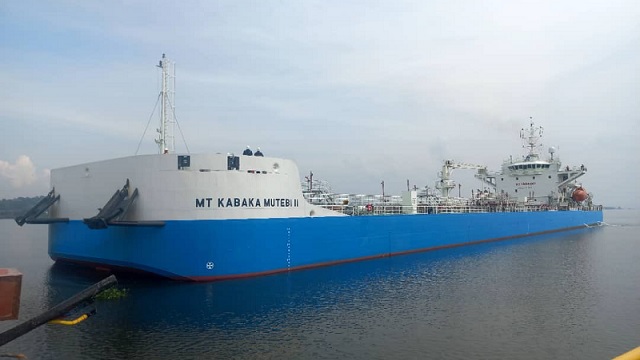
Kampala, Uganda | THE INDEPENDENT | The recent start of fuel transportation by the MT (Motor Tank) Kabaka Mutebi II along the Kisumu-Entebbe route is a potential disruption in the entire delivery chain, according to experts.
The ship which is said to have the capacity to carry 4.5 million litres at once is the first vessel of its type in Uganda to transport fuel into the country by water.
Currently, more than 80 per cent of petroleum products are transported by road tankers whether from Kenya or Tanzania. But one road tanker carries about 20,000 litres of fuel, while just a wagon on a ship carries 60,000 litres.
MV Uhuru, a vessel owned by the Kenyan government through Kenya Railways Corporation, launched operations between Kisumu and Port Bell, three years ago, but only has a capacity of 1.1 million litres, four times smaller than Mutebi II.
According to Mahathi Infra Uganda Ltd, the group of inventors behind the Ugandan ship, she is capable of replacing 150 trucks carrying oil. Uganda Revenue Authority says this should lower the cost of fuel as much of it will now be transported by water, as opposed to trucks.
“With the vessel’s full utilization, fuel prices will reduce, resulting in fair commodity prices in the country,” said Geoffrey Balamaga, the Assistant Commissioner of Field Services. A cubic meter of fuel (1,000 litres) costs 40 US Dollars or 148,000 Shillings to transport compared to a maximum of 92,000 Shillings by ship, meaning that between 30 and 50 per cent of the cost will be saved.
Balamaga added that a lot will also depend on the fuel importers opting for the ships as a means of bringing in the products, which will also help them ease business operation costs. URA says it has been clearing up to 400 tankers per day at the Uganda-Kenya borders of Malaba and Busia, and that having the bulk product transported by one single vessel, will help ease taxation, make it cheaper and reduce space for tax fraud.
Francis Kisirinya, the Deputy Executive Director at the Private Sector Foundation-Uganda, says that the consumer will be the biggest winner, benefiting from the low prices. Kisirinya says that as companies transfer the cost reduction benefit, consumers will have some relief.
Dinesh Donadi, the Project Manager at Mahathi Infra Uganda said that the commercial operations of MT Kabaka Mutebi II will commence next week after all the required tests are done, as they plan to introduce three more ships. At PSFU, they also hope that the plans announced will be realized and sustained, which would stabilize the supply.
This, according to him, will reduce the incidents or the impact of issues that trackers face leading to delays on the road and even strikes that disrupt supply. He adds that this will be boosted by the 70-million litre storage facility at Kawuku, near Entebbe in Wakiso District, as announced by the shipping company.
Uganda consumes an average of 6.5 million litres of fuel every day or just more than 40 million per week, and if the ship delivers twice a week, it will account for a quarter of the supplies. Now with MV Uhuru and another three vessels already in the pipeline under the 120-million-dollar Mahathi prrogram, Uganda’s petroleum products imports could all be by water soon.
PSFU’s Kisirinya says the fuel trackers could find themselves with no business because they wouldn’t compete with the cheap and more efficient water transport. According to him, this that have already invested in this business should better start looking for alternative business activities for their vehicles.
In July 2021, the government also commissioned the transportation of petroleum products by water, this time aboard the MV Kaawa from Mwanza, Tanzania to Port Bell in Kampala. She has the capacity to carry 1 million litres or 22 wagons, which the Uganda Railways Corporation, says is the equivalent of 44 trucks.
*****
URN
 The Independent Uganda: You get the Truth we Pay the Price
The Independent Uganda: You get the Truth we Pay the Price



In addition to Kaawa and Uhuru, there are plans to build 2 more wagin ferries by Uganda through the African Development Bank.
#wagon ferries